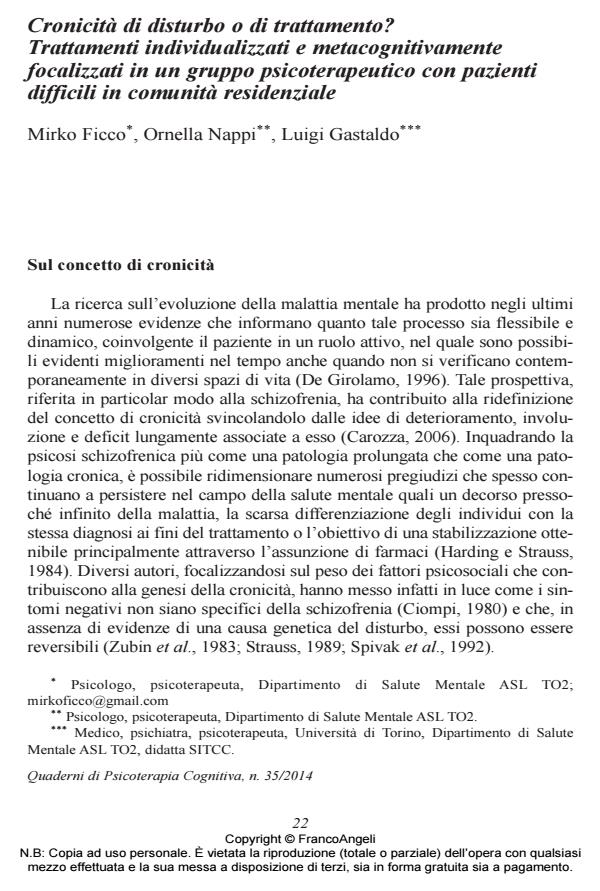Chronicity of disorder or of treatment? Individual and focused on metacognition treatments in a group psychotherapy for severe patients in a therapeutic community
Journal title QUADERNI DI PSICOTERAPIA COGNITIVA
Author/s Mirko Ficco, Ornella Nappi, Luigi Gastaldo
Publishing Year 2014 Issue 2014/35
Language Italian Pages 15 P. 22-36 File size 77 KB
DOI 10.3280/QPC2014-035002
DOI is like a bar code for intellectual property: to have more infomation
click here
Below, you can see the article first page
If you want to buy this article in PDF format, you can do it, following the instructions to buy download credits

FrancoAngeli is member of Publishers International Linking Association, Inc (PILA), a not-for-profit association which run the CrossRef service enabling links to and from online scholarly content.
In the renewal process of rehabilitation techniques in therapeutic communities, interest raised in new treatments that could evaluate clinical work with severe psychotic patients beyond their high social impairment, poor quality of life and severe symptoms, with the aim of limiting the many prejudices on chronicity. Starting a specific group psychotherapy created the need of focusing the intervention and verifying its efficacy, with special attention both on themes that emerged and the mental processes involved. The Metacognition Assessment Interview (MAI, Semerari et al., 2003) was used to identify the poorest metacognitive abilities, on which we focused our intervention during the psychotherapeutic dialogue. The central aim of our job was the therapeutic action on the individual even in a group psychotherapy. At the end of the therapy, patients showed an improved ability to report the narrative details on which the work was focused. Our observations found a positive feedback in scores for different metacognitive functions, measured before and after the therapy. Comparison of HONOS and PANNS scales seemed to report an improvement in social functioning, with unchanged or reduced symptoms. This experience confirms the possibility to go beyond therapeutic practices that are structured on a single type of chronic patient, and foresees a possible good recovery even in severe and stabilized mental suffering. This is in line with the hypothesis of an heterogeneous ability of mentalization in equal disorders.
Keywords: Psychiatric rehabilitation, psychotic patients, chronicity, metacognition, MAI (Metacognition Assessment Interview), focused treatment.
Mirko Ficco, Ornella Nappi, Luigi Gastaldo, Cronicità di disturbo o di trattamento? Trattamenti individualizzati e metacognitivamente focalizzati in un gruppo psicoterapeutico con pazienti difficili in comunità residenziale in "QUADERNI DI PSICOTERAPIA COGNITIVA" 35/2014, pp 22-36, DOI: 10.3280/QPC2014-035002